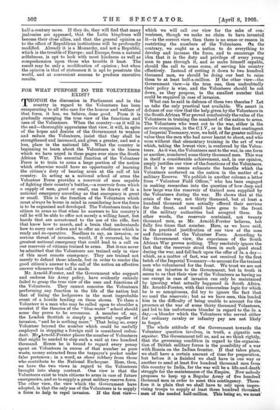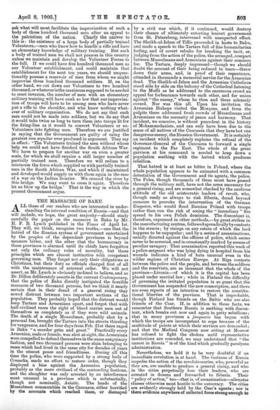FOR WHAT PURPOSE DO THE VOLUNTEERS EXIST? T HOUGH the discussion
in Parliament and in the country in regard to the Volunteers has been exasperating to all who care for the honour and welfare of that force, it has, we believe, done good. From it is gradually emerging the true view of the functions and uses of the Volunteers. When the country—as it will in the end—thoroughly appreciates that view, it will, in spite of the hopes and. desires of the Government to weaken and reduce the Volunteers, insist that they shall be strengthened and increased, and given a greater, and not a less, place in the national life. What the country is beginning to learn about the Volunteers is the lesson which we have urged in these pages ever since the South African War. The essential function of the Volunteer Force is to train to arms a large portion of the nation which otherwise would have no opportunity of learning the citizen's duty of bearing arms at the call of his country; In acting as a national school of arms the Volunteer Force provides a reservoir of men capable of fighting their country's battles,—a reservoir from which a supply of men, great or small, can be drawn off in a national emergency according as that emergency is great or small. This is the function of the Volunteers which must always be borne in mind in considering how the force is to be organised and developed. The Volunteers train the citizen to arms so that when he answers to his country's call he will be able to offer not merely a willing heart, but hands that are accustomed to the use of the rifle, feet that know how to march, and a brain that understands how to carry out orders and to offer an obedience which is ready and co-operative. Needless to say, an invasion, or serious threat of invasion, would, if it occurred, be the greatest national emergency that could lead to a call on our reservoir of citizens trained to arms. But it can never be admitted that the Volunteers are trained only in view of this most remote emergency. They are trained not merely to defend these islands, but in order to render the good citizen's answer to the call of the nation an effective answer whenever that call is made.
Mr. Arnold-Forster, and the Government who support and endorse his Army policy, have evidently entirely failed to grasp the true view of the uses and functions of the Volunteers. They cannot conceive the Volunteers performing any function in the life of the nation but that of lining the hedgerows in the most improbable event of a hostile landing on these shores. To them a Volunteer is a man who may be called upon to shoulder a musket if the theories of the " blue-water " school should some day prove to be erroneous. A member of, say, the London Scottish is simply a potential repeller of invasion, "and he is nothing more." That being so, every Volunteer beyond the number which could be usefully employed in stopping a foreign raid is considered redun- dant. MrtArnold-Forster places the number of Volunteers that might be needed to stop such a raid at two hundred thousand. Hence he is bound to regard every penny spent on Volunteers in excess of that number as pure waste, money extracted from the taxpayer's pocket under false pretences ; in a word, as sheer robbery from those who contribute to the National Exchequer. Here, then, we have the two views in regard to the Volunteers brought into sharp contrast. One view is that the Volunteers exist to train citizens to arms in case of future emergencies, and so to supply a great military reserve force. The other view, the view which the Government have adopted, is that the only use of the Volunteers is to supply a force to lelp to repel invasion. If the first view— which we will call our view for the sake of con- venience, though we make no claim to have invented it—is the correct view, then there is no sense or reason in restricting the numbers of the Volunteers. On the contrary, we ought as a nation to do everything to develop and increase the force, and to encourage the idea that it is the duty and privilege of every young, man to pass through it, and so make himself capable,. should the call to arms come, of serving his country effectively. Instead of cutting it down to two hundred thousand men, we should be doing our best to raise them to at least half-a-million. If the other View—the Government view—is the true one, then undoubtedly their policy is wise, and the Volunteers should be cut down, as they propose, to the smallest number that could be required in case of invasion. What can be said in defence of these two theories ? Let us take the only practical test available. We assert in defence of our view that the help given by the Volunteers in the South African War proved conclusively the value of the. Volunteers in training the manhood of the nation to arms. The Volunteers who went out to the war, either in the service companies, in the C.I.V., or in the first contingent of Imperial Yeomanry, were, we hold, of far greater military value than the men who had never learnt to shoot, and who were without that elementary training in the art of war which, taking the lowest view, is conferred by the Volun- teers. As it was, the Volunteers sent to the war, in one form' or another, numbered some thirty thousand men. This was in itself a considerable achievement, and, in our opinion, amply justifies our view of the functions of the Volunteers. But it by no means exhausts the benefits which the Volunteers conferred on the nation in the matter of a military Reserve. We publish in another column a letter from "Volunteer Field Officer," who has been engaged in making researches into the question of how deep and how large was the reservoir of trained men supplied by the Volunteers during the war. He shows that at the crisis of the war, not thirty thousand, but at least a hundred thousand men actually offered their services for the front, and would have gone to the front if the military authorities had accepted them. In other words, the reservoir contained, not twenty' thousand men, as Mr. Arnold.-Forster believes, but fully five times that number. Here, as we have said, is the practical justification of our view of the uses and functions of the Volunteer Force. According to the Government view, the experience of the South African War proves nothing. They resolutely ignore the fact that the reservoir stood them in such good stead during the war, and fall back upon the offer of 5s. a day— which, as a matter of fact, was not received by the first batch of the Imperial Yeomanry—to account for the trained men who volunteered for the front. We trust we are not doing an injustice to the Government, but in truth it seems to us that their view of the Volunteers as having no use except in case of invasion can only be maintained by ignoring what actually happened in South Africa. Mr. Arnold-Forster, with that remorseless logic for which he is so conspicuous, did try to ignore the fact that we used the reservoir; but as we have seen, this landed' him in the difficulty of being unable to account for the presence at the war of some thirty thousand Volunteers, and led to his unfortunate blunder in regard to the 5s. a day,—a blunder which the Volunteers who served either for ordinary cavalry or infantry pay are not likely' to forget.
The whole attitude of the Government towards the Volunteer question involves, in truth, a gigantic non sequitur. The Government tell us, and as we think- rightly; that the governing condition in regard to the organisa- tion of British military forces is the possibility of a war with Russia on the Indian frontier. If that takes place,' we shall have a certain amount of time for preparation, but before it is finished we shall have in one way or another to send at least five hundred thousand men from this country to India, for the war will be a life-and-death struggle for the maintenance of the Empire. Now nobody proposes to keep up a Regular Army of five hundred thousand men in order to meet this contingency. There- fore it is plain that we shall have to rely upon impro- vising troops to supply at least three hundred thouszazd men of the needed half-million. This being so, we inuse ask what will most facilitate the improvisation of such a body of three hundred thousand men after an appeal to the patriotism of the nation. Clearly the answer to this is : the existence of a large body of partially trained Volunteers,—men who know how to handle a rifle and have an elementary knowledge of military training But such a body of trained men we shall not possess in this country unless we maintain and develop the Volunteer Forces to the full. If we could have five hundred thousand men as our Volunteer establishment, and could maintain that establishment for the next ten years, we should unques- tionably possess a reservoir of men from whom we might improvise three hundred thousand soldiers. If, on the other hand, we cut down our Volunteers to two hundred thousand, or whatever is the maximum supposed to be needed to meet invasion, the number of men with an elementary military training will have sunk so low that our improvisa- tion of troops will have to be among men who have never put a rifle to the shoulder, and who know nothing what- ever of military organisation. We do not say that such men could not be made into soldiers, but we do say that it would take twice as long to turn them into troops fit for the firing-line as it would to convert Volunteers or ex- Volunteers into fighting men. Therefore we are justified in saying that the Government are guilty of using the greatest non sequitur ever produced in argument. They say in effect : The Volunteers trained the men without whose help we could not have finished the South African War. We have to prepare for another war on even a greater scale, for which we shall require a still larger number of partially trained men. Therefore we will reduce to a minimum the force which supplied us with partially trained men in the South African War, and which if maintained and developed would supply us with them again in the case of a war on the Indian frontier. We crossed the river by this bridge. We may want to cross it again. Therefore let us blow up the bridge.' That is the way in which the present Government argue.











































 Previous page
Previous page